
The risks to police officers who have unauthorised contact with journalists has been highlighted by Stephen Wright in a blog for the Daily Mail.
The former crime reporter highlights four cases where officers have been arrested for giving information to journalists, even though no money was found to have changed hands.
And he draws a comparison between the case of an officer who leaked information to The Guardian with that of officers accused of giving stories to the tabloids.
He notes that in August 2011, Detective Constable Peter Cripps was arrested at his desk.
It was later found that there had been 500 phone calls between him and The Guardian’s Amelia Hill and that he was a source of information about the Met’s hacking investigation (particular about journalists who had been arrested).
Wright reports that Cripps was allowed to retire early and take his police pension without facing disciplinary proceedings.
But three senior officers accused of leaking information to tabloid newspapers are yet to find out whether they will face criminal trials.
Met chief supt Dave Cook was arrested back in January 2012 and the Independent Police Complaints Commission continues to leave him in limbo. They have yet to decide whether a file will be sent on him to the Crown Prosecution Service.
Met chief superintendent Andy Rowell was arrested in February 2013. The Crown Prosecution Service dropped the case against him but he could still face a gross misconduct hearing.
Former City if London Police Assistant Commissioner Frank Armstrong was arrested in a dawn raid in March 2013 on suspicion of leaking information to a tabloid journalist.
Some 19 months on he remains on police bail.
With the stakes now evidently so high it is no wonder many police officers are reluctant to talk to journalists.
The treatment meted out to the three officers mentioned above would be justifiable if they were having unathorised contact with criminals, or perhaps a foreign power.
But should sharing information with people who are paid to be the eyes and ears of the public really be considered such a serious matter?
Should merely talking to a journalist be treated as a potential criminal offence by the police?
Email pged@pressgazette.co.uk to point out mistakes, provide story tips or send in a letter for publication on our "Letters Page" blog
